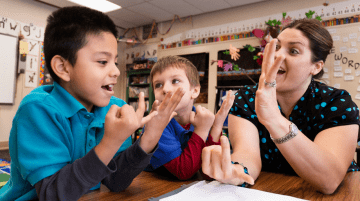Well-implemented programs designed to foster social and emotional learning (SEL) are associated with positive outcomes for students, ranging from better test scores and higher graduation rates to improved social behavior. Under the Every Student Succeeds Act (ESSA), states now have the opportunity to support and encourage increased attention to SEL and the development of a positive school climate by including measures of students’ social-emotional, as well as academic, development in their accountability and improvement systems.
What is social-emotional learning?
Social and emotional learning (SEL) is “the process through which children and adults acquire and effectively apply the knowledge, attitudes, and skills necessary to understand and manage emotions, set and achieve positive goals, feel and show empathy for others, establish and maintain positive relationships, and make responsible decisions.”
—The Collaborative for Academic, Social, and Emotional Learning (CASEL)
This report provides a framework for considering how measures of SEL and school climate may be incorporated in a multitiered accountability and continuous improvement system that provides useful information about school status and progress at the state, district, and school levels. We consider (a) measures of students’ social and emotional skills, habits, and mindsets; (b) measures of school climate and supports for SEL; and (c) measures of student outcomes, such as chronic absenteeism and suspension rates, that are related to school climate and supports for SEL. Some measures could fit in multiple tiers, depending on a state’s context.
After reviewing each measure in greater depth, we reached the following four conclusions.
- States should not use measures of students’ social and emotional competence for accountability purposes, at least for now. They can, however, support the use of these measures at the local level to inform teaching, learning, and program investments. These indicators can provide important information that identifies students’ strengths and needs as they relate to SEL, which might be reported on an aggregate basis to inform school decisions about programs and supportive strategies.
- States could consider including measures of school climate, supports for social-emotional learning, and related outcomes—such as school climate surveys, suspension rates, and chronic absenteeism—in their accountability and statewide reporting systems. These measures may be more appropriate for an accountability system than for measures of students’ individual social and emotional competencies because school climate and supports for SEL are areas that school staff can directly influence, and measurement tools tend to be more advanced.
- States could provide districts with well-validated tools for measuring social-emotional learning and school climate. Well-designed and well-implemented measurement tools can help educators make strategic decisions about needed investments in student services, programs, and professional development. These can range from measures of school climate and students’ social-emotional competencies to diagnostic measures such as protocols for observing and reflecting on teacher and school practices.
- State agencies and districts should provide schools with resources and technical assistance as they hold them accountable. Data alone will not drive school success. Staff need to be trained on how to analyze and act on the data they collect and how to implement high-quality programs, professional development, and school organizational changes that support students’ development. State-level support may include technical assistance for program development or the facilitation of peer learning networks, as well as providing state and federal funding to support school-based efforts.
Encouraging Social and Emotional Learning in the Context of New Accountability by Hanna Melnick, Channa Cook-Harvey, and Linda Darling-Hammond is licensed under a Creative Commons Attribution-NonCommercial 4.0 International License.
This research was supported by a grant from the Raikes Foundation. In addition, the S. D. Bechtel, Jr. Foundation, Ford Foundation, Hewlett Foundation, and Sandler Foundation have provided operating support for the Learning Policy Institute’s work in this area.
